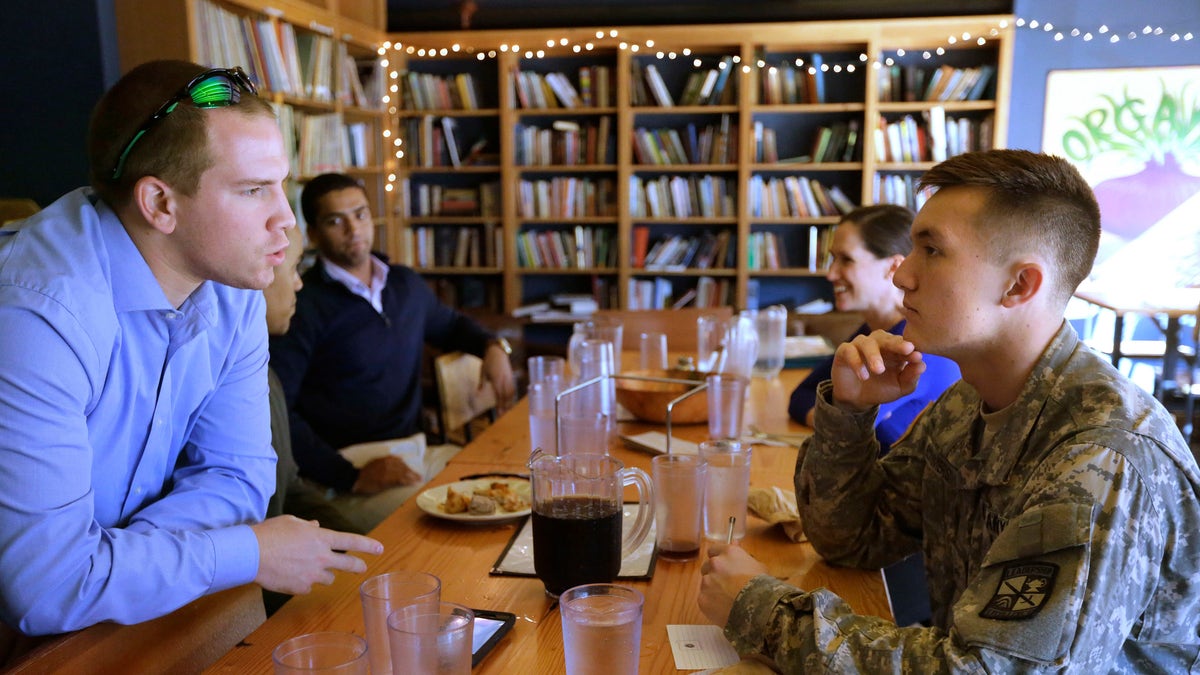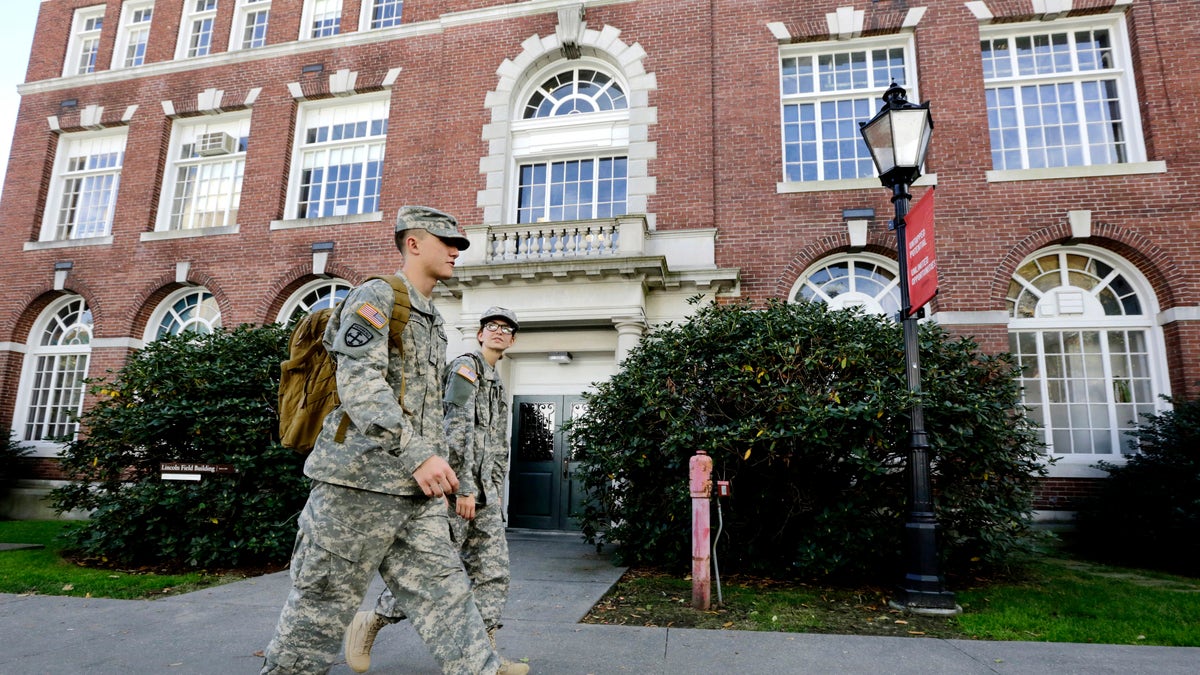
In this Thursday, Oct. 13, 2016 photo U.S. Army reservist and Brown University student Evan Stern, of Oradell, N.J., left, speaks with Brown University student and ROTC cadet William Summers, of Wailuku, Hawaii, right, during a luncheon at a pizza restaurant near the school's campus, in Providence, R.I. (AP)
PROVIDENCE, R.I. – It's not easy to find military veterans in undergraduate programs at most Ivy League schools.
Harvard has only three in its undergrad liberal arts and sciences school. Princeton, just one.
Students from the eight Ivies hope to change those kinds of numbers. They see a chance for institutions to diversify and for veterans to get an education that will help them become leaders.
"If we deny veterans the opportunity to go to these schools, not only do we deny them the same opportunity that others have, but we don't give our future leaders a chance to meet them," said Peter Kiernan, a Columbia University student who served six years in the Marine Corps. "They don't get a chance to learn what it was like on the ground in Afghanistan or what combat is really like. These are important lessons that make them better leaders."
Student veterans have formed the Ivy League Veterans Council to talk about boosting the number of veterans at their schools. They want admissions, enrollment and recruiting policies to be more receptive, and they want veterans to know the Ivy League is an option. The council met for the third time last month, at Yale University.
The council wants the Ivies to address barriers, whether by establishment of a veterans' office, having veterans as recruiters or even just accepting transfer credits.
Officials say they're making changes. Princeton is reinstituting a transfer admission program, partly to help attract and enroll more veterans, a spokesman said. Most veterans have some college credit when they apply, but Princeton couldn't admit them without a transfer program. Brown University, Harvard and the University of Pennsylvania said they're reaching out to veterans organizations.
Dartmouth College partnered with the nonprofit Posse Foundation in 2014 to enroll groups of veterans and provide strong financial and academic support. Yale has conducted informational sessions for veterans and contacted academically strong veterans at community colleges.
FORMER MEMBER OF FAMED TUSKEGEE AIRMEN DIES IN NYC AT 92
James Wright, president emeritus of Dartmouth, said the Ivies should actively recruit veterans like they do international students, athletes and a diverse student body.
The Ivies have a responsibility to educate veterans, but each school should also want more veterans, Wright said. They've demonstrated a willingness to serve and make a difference, and other students won't learn as much if they're around only those who share the same experiences and world views, he said.
"That's what education is about: encouraging us to learn and relearn and unlearn some things we were convinced were true," he said.
About 80 percent of student veterans using GI bill benefits attend public schools, according to the Department of Veterans Affairs.
"We're not a bunch of knuckle draggers, so to speak," said Seamus Murphy, founding president of the Undergraduate Veterans Association of Cornell University. "We're very well-rounded adult learners, with a different experience than the average student. We can bring a lot to the classroom and we can bring a lot to the university."
Twenty-two veterans are undergraduates at Cornell, up from 20 last year, Murphy said, and school administrators have welcomed his input on recruiting more.
Eleven students in Yale College, the university's undergraduate program, are veterans. Brown University has a dozen. Dartmouth has 23 undergraduate student veterans and the University of Pennsylvania about 40, according to the schools. Graduate programs typically have more veterans.
Columbia University is unlike its peers. Its School of General Studies draws hundreds of veterans because it's specifically for returning and nontraditional undergraduate students. It was established to educate veterans after World War II.
Other schools should follow Columbia's lead in evaluating life experience in the application process, said Kiernan, who helped create the Ivy League Veterans Council.
Many veterans don't apply because they don't see these elite schools as an option, Kiernan said. Some might have performed poorly in high school and think college would be the same; the military might have emphasized getting a degree quickly; or they might believe the Ivies won't tolerate veterans, he said.

Brown University students and U.S. Army ROTC cadets William Summers, of Wailuku, Hawaii, left, and Cat Carignan, of Boise, Idaho, right, walk together on the schools campus, in Providence, R.I. (AP)
At Brown, the Office of Student Veterans and Commissioning Programs is reaching out to veterans and hosting monthly luncheons to make current student veterans feel welcome.
Michael Zaskey, who served as an Army medic, graduates in December from Brown with a degree in neuroscience. He thought Brown would have "hippies and drum circles" on every corner, but it wasn't the exclusively liberal school he expected.
Zaskey talks to veterans interested in applying to Brown and is the school's representative to the Ivy League Veterans Council.
"We're trying to get vets to think more about the Ivies and we're trying to get the Ivies to think more about vets," he said.









































